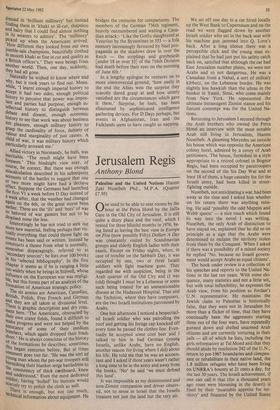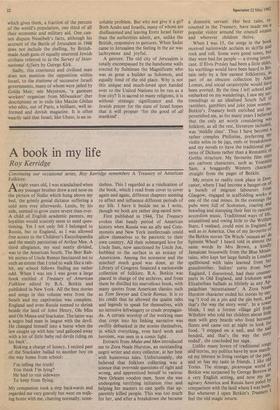Jerusalem Regis
Anthony Blond
(Nile used to be able to rent rooms by the 16-1 hour at the Petra Hotel by the Jaffa Gate in the Old City of Jerusalem. It is still quite a dizzy place and the roof, which I rented for three blissful months in 1976, be- ing listed as having the best view in Europe on Five (now possibly Fifty) Dollars A Day was constantly visited by Scandinavian groups and elderly English ladies with their easels. Except on Friday nights, when, in case of trouble on the Sabbath Day, it was occupied by one, two or three Israeli soldiers with light machine guns. They regarded me with suspicion, being in the Arab quarter of the Old City and (I was told) thought I must be a Lebanese or some such being treated for an unmentionable disease at the Hadassah Hospital. That and the Technion, where they have computers, are the two Israeli institutions patronised by Arabs.
One hot afternoon I noticed a bespectacl- ed Israeli soldier who was patrolling the roof and getting his forage cap knocked off every time he passed the clothes line. Even- tually he accepted some cool beer and I talked to him in bad German (young Israelis, unlike Arabs, have no English, another reason for living where I did) about his life. He told me that he was an accoun- tant and I asked if three years wasn't rather a long time to be in the army and away from the books. 'No' he said 'we must defend this land'.
It was impossible as my disinterested and non-Zionist companion and driver observ- ed, not to sense in Israel that the Israelis treasure not just the land but the very air. We set off one day in a car hired locally up the West Bank to Capernaum and on the road we were flagged down by another Israeli soldier who sat in the back seat with his machine gun jammed into Q. Love's back. After a long silence there was a perceptible click and the young man ex- plained that he had just put his safety catch back on, satisfied that although the car had East Jerusalem number plates, we were not Arabs and so not dangerous. He was a Canadian from a Nahal, a sort of military kibbutz, on the Lebanese border. He was slightly less hawkish than the ultras in the bunker in Yamit, Sinai, who come mainly from New York. He represented the ultimate intransigent Zionist stance and his fiercest contempt was for the United Na- tions.
Returning to Jerusalem I secured through the Arab brothers who owned the Petra Hotel an interview with the most notable Arab still living in Jerusalem, Hazem Nuseibeh. A gleaming Mercedes sat outside his house which was opposite the American colony hotel, admired by a covey of Arab petitioners. The house, furnished in a style appropriate to a retired colonel in Bognor Regis, had been occupied by paratroopers on the second of the Six Day War and at least 18 of them, a huge casualty list for the Israeli army, had been killed in street- fighting outside.
Nuseibeh, not anticipating a war, had been away at the time and I asked him whether on his return there was anything miss- ing. He said 'possibly the odd Mappin and Webb spoon' — a nice touch which found its way into the novel I was writing. Nuseibeh, the only Arab of distinction to have stayed on, explained that he did so on principle as a sign that the Arabs were determined to reclaim the territory stolen from them by the Conquest. When I asked if there was a possibility of a mixed society he replied `No, because no Israeli govern- ment would accept Arabs as equal citizens', The book under review is a collection of his speeches and reports to the United Na- tions in the last ten years. With some elo- quence, many statistics and not a little wit, but with total inflexibility, he expresses the Arab view, from his position as Jordan's U.N. representative. He maintains the Jewish claim to Palestine is historically false, that they were not in Jerusalem for more than a flicker of time, that they have continually been the aggressors starting three out of the four wars, have repeatedly gunned down and shelled unarmed Arab citizens and are currently torturing in their jails — all of which he lists, including the girls reformatory at Tel Mond and that they should abide by resolution 242 of the U.N., return to pre-1967 boundaries and compen- sate or rehabilitate in their native land, the 1.8 million refugees who have been living on UNRRA's bounty at 21 cents a day, for the last 30 years. The Israeli achievement, if one can call it that (for a thousand years ago roses were blooming in the desert) is fired by their 'insatiable appetite for ter- ritory' and financed by the United States
which gives them, a fraction of the percent of the world's population, one third of all their economic and military aid. One can- not dispute Nuseibeh's facts, although his account of the Battle of Jerusalem in 1948 does not include the shelling, by British- made Arab guns of equally unarmed Jewish civilians referred to in the Survey of Inter- national Affairs by George Kirk.
Sadly, this courteous and civilised man does not mention the opposition within Israel, to the etatisme of successive Israeli governments, many of whom were jailed by Golda Meir; nee Meyerson, 'a garment workers' organiser from Milwaukee' (her description) or in exile like Maxim Ghilan who edits, out of Paris, a brilliant, well in- formed and dovish magazine. It is often wearily said that Israel, like Ulster, is an in-
soluble problem. But why not give it a go? Both Arabs and Israelis, many of whom are disillusioned and leaving Eretz Israel faster than the authorities admit, are, unlike the British, responsive to gestures. When Sadat came to Jerusalem the feeling in the air was lachrymose and joyful.
A gesture. The old city of Jerusalem is totally encompassed by the handsome walls erected by Suleiman the Magnificent who was as great a builder as Solomon, and equally fond of the old place. Why is not this unique and much-loved spot handed over to the United Nations to be run as a free city? It is sacred to many religions, it is without strategic significance and the Jewish prayer for the state of Israel hopes that it will propser 'for the good of all mankind'.







































 Previous page
Previous page